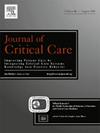中心静脉置管起始颈静脉置管位置选择对血液透析导管并发症的影响。
IF 3.2
3区 医学
Q2 CRITICAL CARE MEDICINE
引用次数: 0
摘要
目的:本研究评估危重患者选择右颈内静脉(IJV)与左颈内静脉(CVC)初始置管对血液透析导管相关结局的影响。材料和方法:回顾了马里兰大学医学中心在2019年1月1日至2022年12月31日期间接受IJV CVC的成人重症监护患者的医疗记录,这些患者后来需要额外的临时血液透析导管。结果:该研究包括214例患者,其中100例(46.7%)在右侧IJV接受原发性CVC, 114例(53.3%)在左侧IJV接受原发性CVC。右侧IJV组血液透析导管再插入率更高(40%,左侧IJV组为2.6%)。结论:危重患者在右侧IJV中启动CVC放置与血液透析导管再插入的风险更高相关,这与使用静脉而不是右侧IJV进行血液透析导管放置有关,并且与左侧IJV放置相比,静脉通道干预的需求增加。本文章由计算机程序翻译,如有差异,请以英文原文为准。
Impact of initial jugular vein insertion site selection for central venous catheter placement on hemodialysis catheter complications
Purpose
This study evaluated the impact of choosing the right versus left internal jugular vein (IJV) for initial central venous catheter (CVC) placement on hemodialysis catheter-related outcomes in critically ill patients.
Materials and methods
Medical records from the University of Maryland Medical Center were reviewed for adult critical care patients who received an IJV CVC between January 1, 2019, and December 31, 2022, and later required an additional temporary hemodialysis catheter.
Results
The study included 214 patients, with 100 (46.7 %) receiving the primary CVC in the right IJV and 114 (53.3 %) in the left IJV. The right IJV group had higher hemodialysis catheter re-insertion rates (40 % vs. 2.6 % in the left IJV group, P < 0.001) related to using a different site other than the right IJV for the initial hemodialysis catheter (85 % for the right IJV group vs. 1.75 % for the left IJV group). Hemodialysis catheters were exchanged over a guidewire in 23 % of the right IJV group vs. 0.9 % in the left IJV group (P < 0.001). Additionally, 38 % of patients in the right IJV group required three venous access interventions, with 14 % needing four or more, versus only 2.6 % requiring three interventions in the left IJV group.
Conclusions
Initiating CVC placement in the right IJV in critically ill patients is associated with a higher risk of hemodialysis catheter re-catheterization related to the use of veins other than the right IJV for hemodialysis catheter placement and an increased need for venous access interventions compared to placement in the left IJV.
求助全文
通过发布文献求助,成功后即可免费获取论文全文。
去求助
来源期刊

Journal of critical care
医学-危重病医学
CiteScore
8.60
自引率
2.70%
发文量
237
审稿时长
23 days
期刊介绍:
The Journal of Critical Care, the official publication of the World Federation of Societies of Intensive and Critical Care Medicine (WFSICCM), is a leading international, peer-reviewed journal providing original research, review articles, tutorials, and invited articles for physicians and allied health professionals involved in treating the critically ill. The Journal aims to improve patient care by furthering understanding of health systems research and its integration into clinical practice.
The Journal will include articles which discuss:
All aspects of health services research in critical care
System based practice in anesthesiology, perioperative and critical care medicine
The interface between anesthesiology, critical care medicine and pain
Integrating intraoperative management in preparation for postoperative critical care management and recovery
Optimizing patient management, i.e., exploring the interface between evidence-based principles or clinical insight into management and care of complex patients
The team approach in the OR and ICU
System-based research
Medical ethics
Technology in medicine
Seminars discussing current, state of the art, and sometimes controversial topics in anesthesiology, critical care medicine, and professional education
Residency Education.
 求助内容:
求助内容: 应助结果提醒方式:
应助结果提醒方式:


